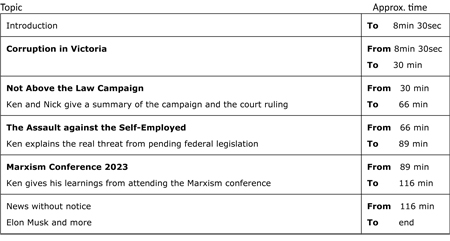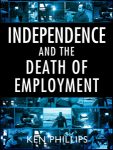 We’ve alerted you in the past to the Albanese government’s plan to deny people the right to be self-employed. It’s an attack upon your basic freedom to decide how you earn your income. That attack plan is now unfolding.
We’ve alerted you in the past to the Albanese government’s plan to deny people the right to be self-employed. It’s an attack upon your basic freedom to decide how you earn your income. That attack plan is now unfolding.
The Department of Employment and Workplace Relations (DEWR) has released a consultation paper on the implementation of Labor’s plan. We’re preparing a detailed submission (due on 12 May). Legislation is set for the second half of this year.
Be very clear. We totally reject this agenda. It’s bad on many fronts. We’ll explain the multiple problems progressively over the following weeks.
We have started talking to Senators and MPs about why this is so bad and should be stopped. We’ll be very actively pushing to defend the right to be self-employed.
We’ve prepared a summary of the DEWR consultation paper. We’ve tried to reflect what they are saying accurately.
In broad summary, Labor’s plan is to:
- Treat the commercial contract used by self-employed people as an employment contract.
- Regulate self-employed people through the Fair Work Commission, thus creating conflict with commercial law and regulation by the Australian Consumer and Competition Commission. The DEWR papers says that this will be done on a limited selective basis. But those limits are as yet unknown.
Frankly, we see our campaign as perhaps the most important one that we have conducted in SEA’s 24-year history. We must attempt to stop this.
We argue that Labor’s plan is a recipe for commercial contract confusion and uncertainty. We find the consultation paper to be a confused hotchpotch itself, as it is forced to weave a path through well-established legal, regulatory and policy principles and practices. This is so because the plan would generate conflict with those principles and practices on a wide scale.
At this stage we seek to understand the detail of Labor’s agenda. The difficulty is that the agenda is wrapped up in seemingly good intentions which mask its true consequences.
Many people have asked us for more information. We suggest that you read our summary first and see what you think. We’ll release our analysis progressively.
 At Self-Employed Australia we’re covering what seems to be a wide range of topics. In fact, these all come back to a central ‘thing’ that we seek to protect—namely, your right to be self-employed should you wish. That is, your right to Be Your Own Boss.
At Self-Employed Australia we’re covering what seems to be a wide range of topics. In fact, these all come back to a central ‘thing’ that we seek to protect—namely, your right to be self-employed should you wish. That is, your right to Be Your Own Boss.

 I let you know a little while ago that I’ve started posting as a Substack writer. Substack is for obsessive writers (like me). I’ve called my Substack
I let you know a little while ago that I’ve started posting as a Substack writer. Substack is for obsessive writers (like me). I’ve called my Substack  I explain that:
I explain that: This article looks at the labour academic argument that self-employed people can be a ‘little bit an employee’. I explain that:
This article looks at the labour academic argument that self-employed people can be a ‘little bit an employee’. I explain that: You may not be aware that I published a book on this in 2008. I’ve decided to make this available through Substack in serialised, chapter format. I’ll progressively release chapters. In this first release I provide the book’s Introduction. In it I quote Roman Emperor Caligula who stated:
You may not be aware that I published a book on this in 2008. I’ve decided to make this available through Substack in serialised, chapter format. I’ll progressively release chapters. In this first release I provide the book’s Introduction. In it I quote Roman Emperor Caligula who stated: The Albanese government’s determination to legislate an ‘employee-like’ definition will introduce radical law that will deny protections to Australia’s self-employed people.
The Albanese government’s determination to legislate an ‘employee-like’ definition will introduce radical law that will deny protections to Australia’s self-employed people. One of the most controversial and confusing issues for tax and labour law over the last 50 years is whether a worker is an employee or self-employed.
One of the most controversial and confusing issues for tax and labour law over the last 50 years is whether a worker is an employee or self-employed. The Australian Taxation Office views small business tax debt as a major problem. The ATO says that
The Australian Taxation Office views small business tax debt as a major problem. The ATO says that  Despite the Albanese government’s description of self-employed
Despite the Albanese government’s description of self-employed  In our
In our  If you’ve ever been to a pub gig, you’ll have taken part in what the Albanese government wants to (effectively) close down. The Albanese agenda is starkly clear after Workplace Relations Minister Tony Burke declared the ‘gig economy’ is a ‘cancer’.
If you’ve ever been to a pub gig, you’ll have taken part in what the Albanese government wants to (effectively) close down. The Albanese agenda is starkly clear after Workplace Relations Minister Tony Burke declared the ‘gig economy’ is a ‘cancer’. We’ve been
We’ve been